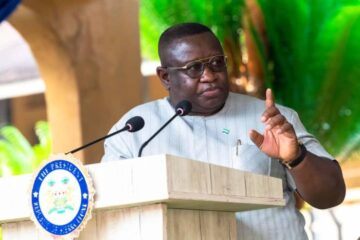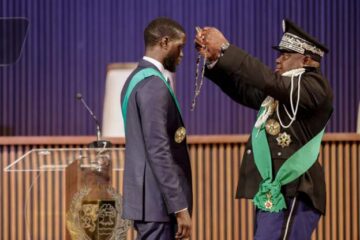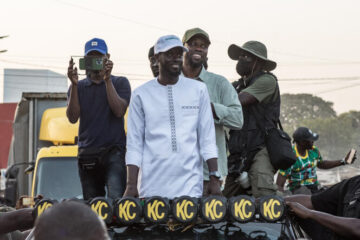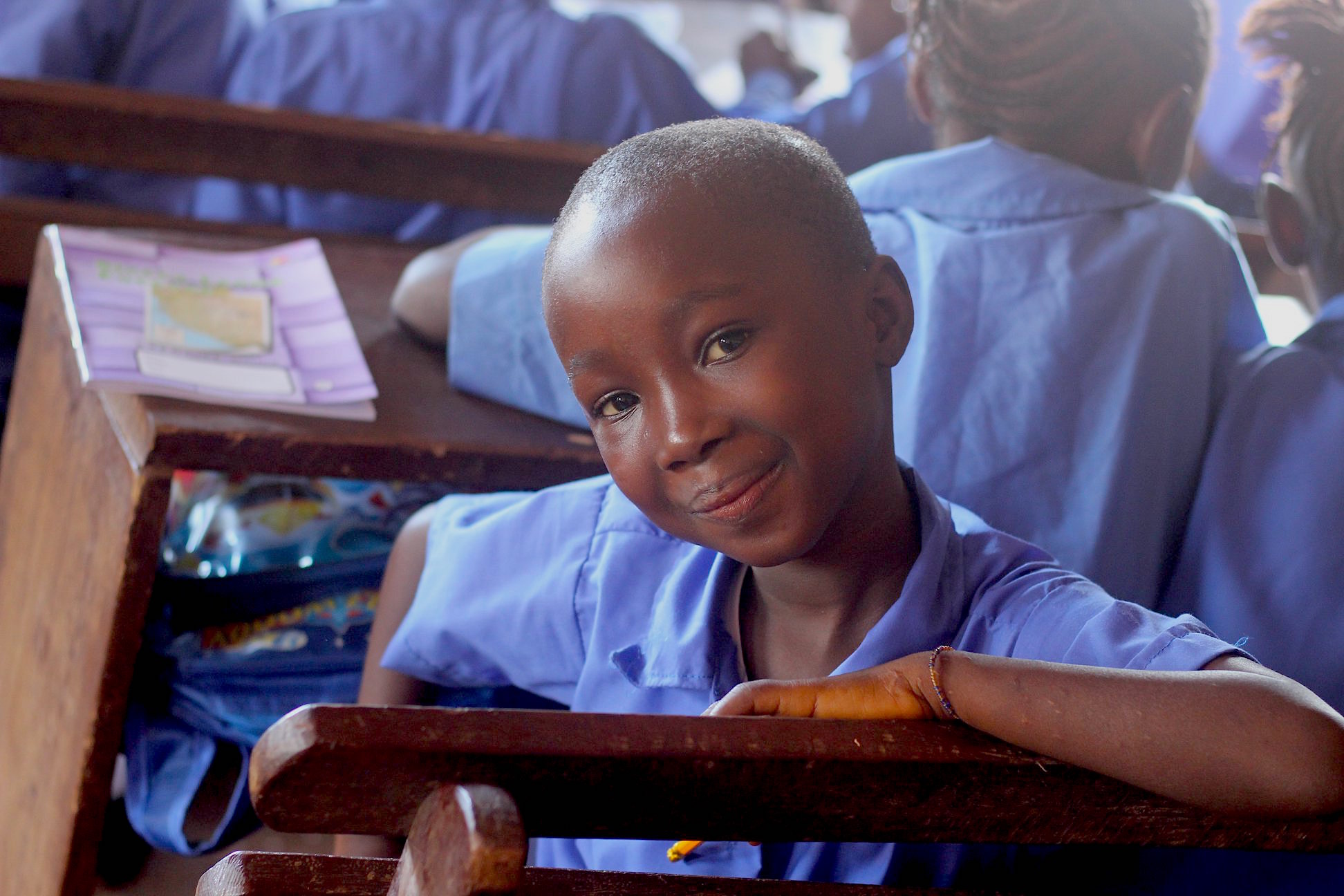Sahid Koroma, owner Marika Enterprises conducts Sierra Leone’s first july rice harvest using irrigation
In the 3 years I have spent in Sierra Leone, this weekend was one of my most inspiring and educational experiences. I went to Wellington to see Mr. Sahid Koroma a lead i got from the Minister of Agriculture on our TV Show on the local rice industry. When i met Mr. Sahid he was wearing a pair of oil stained tan colored cargo trousers and stripped polo shirt. If i didn’t know he was the owner of the rice mill i would have thought him to be an ordinary man of even more ordinary circumstances. Over the past couple weeks the Vickie Remoe Show has been recording a mini documentary on the local rice industry. We have been on a quest to understand why 95% of the rice consumed in Sierra Leone is imported from Burma, Thailand, Malaysia, India, and China while the government asserts that we are at 70% rice self sufficiency.What happens to the rice produced locally? Why is it so difficult to find local country rice in the market? Why are we eating imported rice? Why are we spending $5 million to import our staple food?
We went to the Krootown rd. market asking market women to compare the sales of imported rice to local country rice and they explained that imported rice is cheaper by cup and more available in the market than the country rice. In addition, they explained that some customers’ feeding preferences have changed over time and no longer have a taste for country rice. There is a whole generation of young adults and children in Freetown especially who have been bred almost entirely on imported rice/english rice/whiteman rice.
I spoke to the Minister of Trade-David Carew to understand the government’s plans to mechanize rice cultivation and reduce the trade deficit and confirmed that Sierra Leoneans spend more than $5 million a year importing rice. He explained that the government was eager to develop feeder roads to increase transportation of the cultivated rice from rural areas to major towns and that the ministry was eager to support private companies constructing rice mills or packaging rice for the local market. In short, other than receiving rice concessions from other countries nothing was being done at the ministry of trade to foster or improve local rice mechanization.
I also spoke to the Minister of Agriculture Dr. Sam Sesay who confirmed that rice cultivation was at 70% self sufficiency. But he acknowledged that most of the rice that is cultivated does not make it into the major markets to supply the demand. The farmers eat most of what the produce and the rest is sold across borders to Liberia and Guinea. Dr. Sam Sesay said that president Koroma’s govt. had deployed 346 tractors in the past two years to farmers in all the districts who had requested for equipment from the ministry. I told him that i had heard rumors that APC supporters were getting more support than farmers in other regions. The minister then went on to say that Kailahun had only asked for 3 tractors and they had been given them. I found it quite curious that the minister used Kailahun as an example given the APC party’s history in that area.
The Minister of Agriculture explained that the government was developing 30 rice mills around the country and this was going to improve and increase the production of local rice. I was surprised when Dr. Sam Sesay brought up the govt’s desire to import 10,000 bags of inorganic chemical fertilizer from china. I asked him why we couldn’t produce local fertilizer and he explained that there was no where in west africa, sierra leone included capable of producing fertilizer. Finally, I asked Dr. Sam Sesay if he knew of any local companies producing rice and he mentioned ARUL a company owned by Duranette Davies, and MARIKA Enterprises a rice and palm kernel mill in wellington that was to complete sierra leone’s first july irrigation rice harvest in a couple of days.
We met Mr. Said Koroma early saturday morning in wellington and we were to accompany him to his 100 acre farm in Masiaka to witness the first symbolic irrigation harvest. I asked Mr. Koroma why the harvest was symbolic and he explained that this was the first time in Sierra Leone’s rice cultivation history that anyone had ever harvested rice in July. Since time and memorial, local rice farmers have planted their seeds in April/May and harvested in September a process that heavily depends on the rains. With the use of irrigation and a rice grain similar to the Nerica breed invented by Sierra Leonean Times Magazine Most Influential Scientist, Dr. Monty Jones of the FARA, Mr. Said Koroma was able to accomplish what no other farmer has been able to do; harvest rice in July.
Said Koroma’s Marika Enterprises produces one of maybe two branded rice products in Sierra Leone. The local country rice is cultivated, milled, produced, and marketed in Salone and sold by bags to market women. What makes Said Koroma’s Marika Rice incredible is that he uses 100% organic fertilizer that he makes from the waste of the palm kernels at his factory. When I asked him about the Minister of Agriculture’s comments on the lack of fertilizer in W. Africa, Said explained that the minister was not only aware of his organic agriculture but he had provided farmers with samples to the ministry to test with local farmers. Mr. Koroma explained that organic fertilizer was not only better for the rice but that it’s residual properties makes it so that farmers need less of the fertilizer each subsequent planting season. While the ministry was looking to import inorganic fertilizer from China Mr. Koroma claims that he recently exported 10,000 tons of organic fertilizer to a dutch buyer in holland. Marika Organic Fertilizer retails locally for 20 leones ($5) a bag while imported chemical fertilizer retails for 200,000 ($50) leones.
As i spoke to Mr. Koroma and i partook of my first rice harvest in the fields with my knife in hand cutting the rice from the root with the local farmers employed on the farm. I couldn’t help feeling that i had spent the past couple years chasing a golden fleece right under my nose. I thought, “this is how you become a millionaire…you have to invest in the land, in agriculture, feeding the people their staple”. The Marika Mill in wellington at maximum input can mille up to 2000 bags of rice a day, although current input is between 10%-20% depending on the yield of other farmers who sell their rice to Mr. Koroma.
There is more demand for the rice than Marika can supply; so the business needs more than the $1,5 million already invested to increase cultivation and out put. Mr. Koroma currently employs between 500-1000 depending on the season and he has plans to expand his farm and irrigation method to up to 1000 acres for rice cultivation. He stands to make millions of dollars in profit and i hope young saloners will look to him and see him as an example of where they should be.
So if you are out there and you are thinking i wanna come to Sierra Leone what should i put my money in? Forget whatever else u might be thinking…large scale industrial farming is the only way forward.
The minute we can tap into mechanized large scale agriculture Sierra Leone’s development will finally go where it needs to.
Marika in the News 2004 President Commisions refurbished PK Mill
President Koroma Receives Locally Produced Rice from Marika & Arul Enterprises



















